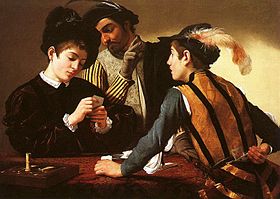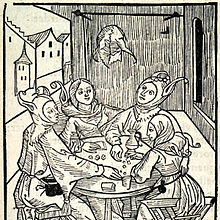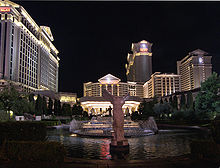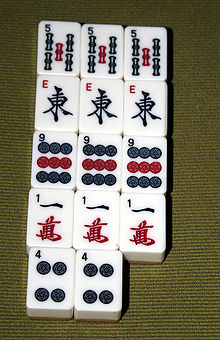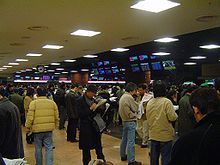- Gambling
-
Gambling is the wagering of money or something of material value (referred to as "the stakes") on an event with an uncertain outcome with the primary intent of winning additional money and/or material goods. Typically, the outcome of the wager is evident within a short period.
The term gaming[1] in this context typically refers to instances in which the activity has been specifically permitted by law. The two words are not mutually exclusive; i.e., a “gaming” company offers (legal) “gambling” activities to the public[2] and may be regulated by one of many gaming control boards, for example, the Nevada Gaming Control Board. However, this distinction is not universally observed in the English-speaking world. For instance, in the UK, the regulator of gambling activities is called the Gambling Commission (not the Gaming Commission).[3] Also, the word gaming is frequently used to describe activities that do not involve wagering, especially online.
Gambling is also a major international commercial activity, with the legal gambling market totaling an estimated $335 billion in 2009.[4] In other forms, gambling can be conducted with materials which have a value, but aren't real money; for example, games like Pogs or Magic: The Gathering.
Contents
History
Religious
Religious perspectives on gambling have been mixed. Both the Catholic and Jewish traditions have even set aside days for gambling,[5] (for Jews Hanukkah), although religious authorities generally disapprove of gambling. Ancient Jewish authorities frowned on gambling, even disqualifying professional gamblers from testifying in court.[6] Gambling has often been seen as having social consequences. For these social and religious reasons, most legal jurisdictions limit gambling.[citation needed] Some Islamic nations prohibit gambling; most other countries regulate it.[7]
Origins
Many popular games played in modern casinos originate from Europe and China. Games such as craps, baccarat, roulette, and blackjack originate from different areas of Europe. A version of keno, an ancient Chinese lottery game, is played in casinos around the world. In addition, pai gow poker, a hybrid between pai gow and poker is also played.[8]
Regulation
Many jurisdictions, local as well as national, either ban or heavily control (by licensing) gambling. Such regulation generally leads to gambling tourism and illegal gambling in the areas where it is not allowed. The involvement of governments, through regulation and taxation, has led to a close connection between many governments and gaming organizations, where legal gambling provides significant government revenue, such as in Monaco or Macau.
United States
Under US federal law, gambling is legal in the United States, and states are free to regulate or prohibit the practice. Gambling has been legal in Nevada since 1931, forming the backbone of the state's economy, and the city of Las Vegas is perhaps the best known gambling destination in the world. In 1976, gambling was legalized in Atlantic City, New Jersey, and in 1990, it was legalized in Tunica, Mississippi; both of those cities have developed extensive casino and resort areas since then. Since a favorable U.S. Supreme Court decision in 1987, many Native American tribes have built their own casinos on tribal lands as a way to provide revenue for the tribe. Because the tribes are considered sovereign nations, they are often exempt from state laws restricting gambling, and are instead regulated under federal law. Additionally, almost all states have legalized gambling in the form of a state-run lottery and most states allow for limited non-profit organizations to host Bingo nights.
Insurance
Because contracts of insurance have many features in common with wagers, insurance contracts are often distinguished under law as agreements in which either party has an interest in the "bet-upon" outcome beyond the specific financial terms. E.g.: a “bet” with an insurer on whether one's house will burn down is not gambling, but rather insurance — as the homeowner has an obvious interest in the continued existence of his/her home independent of the purely financial aspects of the "bet" (i.e., the insurance policy). Nonetheless, both insurance and gambling contracts are typically considered aleatory contracts under most legal systems, though they are subject to different types of regulation.
There is generally legislation requiring that the odds in gaming devices are statistically random, to prevent manufacturers from making some high-payoff results impossible. Since these high-payoffs have very low probability, a house bias can quite easily be missed unless checking the odds carefully.[9]
Types of gambling
Casino games
While almost any game can be played for money, and any game typically played for money can also be played just for fun, some games are generally offered in a casino setting.
Table games
Main article: Table gameElectronic gaming
Other gambling
Non-casino gambling games
Gambling games that take place outside of casinos include Bingo (as played in the US and UK), dead pool, lotteries, pull-tab games and scratchcards, and Mahjong.
Other non-casino gambling games include:
- Card games, such as Liar's poker, Bridge, Basset, Lansquenet, Piquet, Put, Teen patti
- Carnival Games such as The Razzle or Hanky Pank
- Coin-tossing games such as Head and Tail, Two-up*
- Confidence tricks such as Three-card Monte or the Shell game
- Dice-based games, such as Backgammon, Liar's dice, Passe-dix, Hazard, Threes, Pig, or Mexico
*Although coin tossing isn't usually played in a casino, it has been known to be an official gambling game in some Australian casinos[10]
Fixed-odds betting
Fixed-odds betting and Parimutuel betting frequently occur at many types of sporting events, and political elections. In addition many bookmakers offer fixed odds on a number of non-sports related outcomes, for example the direction and extent of movement of various financial indices, the winner of television competitions such as Big Brother, and election results.[11] Interactive prediction markets also offer trading on these outcomes, with "shares" of results trading on an open market.
Parimutuel betting
One of the most widespread forms of gambling involves betting on horse or greyhound racing. Wagering may take place through parimutuel pools, or bookmakers may take bets personally. Parimutuel wagers pay off at prices determined by support in the wagering pools, while bookmakers pay off either at the odds offered at the time of accepting the bet; or at the median odds offered by track bookmakers at the time the race started.
Sports betting
Betting on team sports has become an important service industry in many countries. For example, millions of Britons play the football pools every week. In addition to organized sports betting, both legal and illegal, there are many side-betting games played by casual groups of spectators, such as NCAA Basketball Tournament Bracket Pools, Super Bowl Squares, Fantasy Sports Leagues with monetary entry fees and winnings, and in-person spectator games like Moundball.
Arbitrage betting
Arbitrage betting is a theoretically risk-free betting system in which every outcome of an event is bet upon so that a known profit will be made by the bettor upon completion of the event, regardless of the outcome. Arbitrage betting is a combination of the ancient art of arbitrage trading and gambling, which has been made possible by the large numbers of bookmakers in the marketplace, creating occasional opportunities for arbitrage.
Other types of betting
One can also bet with another person that a statement is true or false, or that a specified event will happen (a "back bet") or will not happen (a "lay bet") within a specified time. This occurs in particular when two people have opposing but strongly held views on truth or events. Not only do the parties hope to gain from the bet, they place the bet also to demonstrate their certainty about the issue. Some means of determining the issue at stake must exist. Sometimes the amount bet remains nominal, demonstrating the outcome as one of principle rather than of financial importance.
Betting exchanges allow consumers to both back and lay at odds of their choice. Similar in some ways to a stock exchange, a bettor may want to back a horse (hoping it will win) or lay a horse (hoping it will lose, effectively acting as bookmaker)
Staking systems
Many betting systems have been created in an attempt to "beat the bookie" but most still accept that no system can make an unprofitable bet profitable over time. Widely used systems include:
- Card counting - Many systems exist for Blackjack to keep track of the ratio of ten values to all others; when this ratio is high the player has an advantage and should increase the amount of their bets. Keeping track of cards dealt confers an advantage in other games as well.
- Due-column betting – A variation on fixed profits betting in which the bettor sets a target profit and then calculates a bet size that will make this profit, adding any losses to the target.
- Fixed profits – the stakes vary based on the odds to ensure the same profit from each winning selection.
- Fixed stakes – a traditional system of staking the same amount on each selection.
- Kelly – the optimum level to bet to maximize your future median bank level.
- Martingale – A system based on staking enough each time to recover losses from previous bet(s) until one wins.
Other uses of the term "gambling"
Many risk-return choices are sometimes referred to colloquially as "gambling." Whether this terminology is acceptable is a matter of debate:
- Emotional or physical risk-taking, where the risk-return ratio is not quantifiable (e.g., skydiving, campaigning for political office, asking someone for a date, etc.)
- Insurance is a method of shifting risk from one party to another. Insurers use actuarial methods to calculate appropriate premiums, which is similar to calculating gambling odds. Insurers set their premiums to obtain a long term positive expected return in the same manner that professional gamblers select which bets to make. While insurance is sometimes distinguished from gambling by the requirement of an insurable interest, the equivalent in gambling is simply betting against one's own best interests (e.g., a sports coach betting against his own team to mitigate the financial repercussions of a losing season).
- Situations where the possible return is a secondary reason for the wager/purchase (e.g. buying a raffle ticket to support a charitable cause)
Investments are also usually not considered gambling, although some investments can involve significant risk. Examples of investments include stocks, bonds and real estate. Starting a business can also be considered a form of investment. Investments are generally not considered gambling when they meet the following criteria:
- Economic utility
- Positive expected returns (at least in the long term)
- Underlying value independent of the risk being undertaken
Some speculative investment activities are particularly risky, but are sometimes perceived to be different from gambling:
- Foreign currency exchange (forex) transactions
- Prediction markets
- Securities derivatives, such as options or futures, where the value of the derivative is dependent on the value of the underlying asset at a specific point in time (typically the derivative's associated expiration date)
Psychological aspects
Studies show that though many people participate in gambling as a form of recreation or even as a means to gain an income, gambling, like any behavior which involves variation in brain chemistry, can become a psychologically addictive and harmful behavior in some people. Reinforcement schedules may also make gamblers persist in gambling even after repeated losses.
The Russian writer Dostoevsky (himself a problem gambler) portrays in his novella The Gambler the psychological implications of gambling and how gambling can affect gamblers. He also associates gambling and the idea of "getting rich quick", suggesting that Russians may have a particular affinity for gambling. Dostoevsky shows the effect of betting money for the chance of gaining more in 19th-century Europe. The association between Russians and gambling has fed legends of the origins of Russian roulette.
Evolutionary psychology suggests that women more than men tend to select mating partners based on their resources. Thus, from an evolutionary perspective men may have had more to gain from a large increase in resources than women have had, which may be one explanation for why men, and especially poor men, tend to gamble more than women.[12]
By country
- Gambling in Australia
- Gambling in France
- Gambling in Japan
- Gambling in Macau
- Gambling in Norway
- Gambling in Russia
- Gambling in South Africa
- Gambling in the United Kingdom
- Gambling in the United States
See also
- Casino
- Comps (casino)
- Faro Ladies
- Gambler's conceit
- Gambler's fallacy
- Gambler's ruin
- Gaming mathematics
- I. Nelson Rose
- Mobile gambling
- Online gambling
References
- ^ United Kingdom Office of Public Sector Information: Definition as Gaming
- ^ Gambling Law US
- ^ UK Gambling Commission
- ^ "You bet". The Economist. 8 July 2010. http://www.economist.com/node/16539402.
- ^ Barlow, Rich (2007-12-02). "Gambling had role in religious history". The Boston Globe. http://www.boston.com/news/local/articles/2007/12/01/gambling_had_role_in_religious_history/.
- ^ Berel Wein. "Gambling". torah.org. http://www.torah.org/features/secondlook/gambling.html. Retrieved 20 July 2010.
- ^ International Association of Gaming Regulators: Members
- ^ "Gambling History, from the beginning.". Gambling Info. http://www.gamblinginfo.com/1_History_of_Gambling.htm. Retrieved 23 June 2011.
- ^ Nevada State Gaming Control Board: Technical Standards (Adopted)
- ^ Gambling Info - The Game of Two up
- ^ ABC.net: US election betting backs Bush
- ^ The Oxford Handbook of Evolutionary Psychology, Edited by Robin Dunbar and Louise Barret, Oxford University Press, 2007, Chapter 32 Evolutionary Psychology and Mental Health, Randolph M. Nesse
External links
Categories:
Wikimedia Foundation. 2010.

